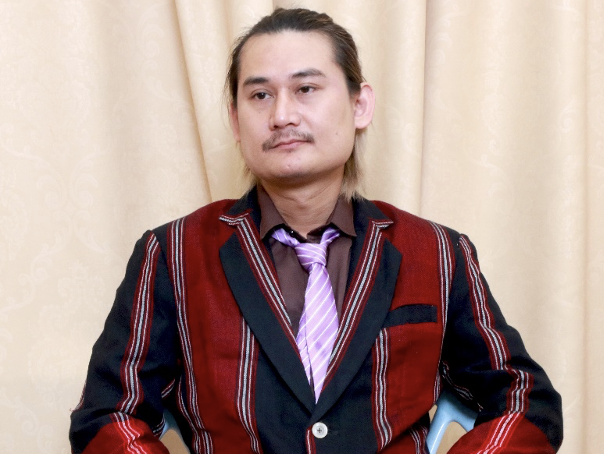An interview with KHRG Spokesperson Saw Nanda Hsu on the current situation facing civilians amid airstrikes by the military council.
Airstrikes by the military council have escalated in southeastern parts of Myanmar, including the Karen National Union’s (KNU) Kawthoolei area.
In November, the Karen Human Rights Group (KHRG) released a report highlighting the growing fear among local communities and the increasingly difficult conditions they face in terms of survival.
The Karen Information Center (KIC) interviewed KHRG spokesperson Saw Nanda Hsu to learn more about the challenges faced by civilians affected by the military council’s airstrikes, the military council’s targeting of civilians, and the needs of internally displaced persons (IDPs) during their displacement, as outlined in KHRG’s recent report.
Q: What is the current situation regarding airstrikes in southern Myanmar, as the military council’s airstrikes continue to intensify across the country? Could you provide details based on KHRG’s records?
A: The military council’s airstrikes remain devastating, with severe damage and a high death toll as the main consequences. These attacks have caused widespread destruction and continue to harm civilians.
Q: Civilian casualties from airstrikes and heavy weapons are reported daily. How have these impacts worsened this year?
A: According to the data we have, civilian casualties have surpassed 400. However, the actual number is likely much higher, as we are unable to collect data on every incident. The actual toll may be significantly greater.
Q: Why are the military’s airstrikes targeting both locations of revolutionary forces and civilian areas?
A: There are two types of attacks: indiscriminate and deliberate. The military is firing indiscriminately, targeting not only enemy positions but also civilian areas. They also deliberately attack civilians, even when there are no opposing forces present. This tactic has been used by the military across different eras. Typically, the military carries out deliberate attacks on both combatants and civilians during operations, with the aim of instilling fear among the population.
Q: What actions need to be taken to stop the military council’s attacks?
A: The military continues to enjoy impunity for the crimes it has committed against civilians throughout successive eras. Since the 2021 coup, the military council has continued to target civilians. There has been no effective action on this until today. The military council has been committing crimes. Effective action must be taken to address this. Only then will the attacks targeting civilians come to an end. That’s why, necessary judicial action must be taken from legal or political standpoints. If there is no such action, the military will continue to commit such crimes. There will be no justice, responsibility, or accountability.
Q: The number of IDPs has increased in southeastern Myanmar, including Karen State, due to the military council’s airstrikes and shelling. Can you provide the current figures on how much this number has increased?
A: The number of internally displaced persons (IDPs) remains consistently high, with displacement caused not only by armed conflicts but also by natural disasters. The figures are unstable and fluctuate over time. Currently, the number of IDPs has surpassed one million.
Q: With over 1,000,000 IDPs fleeing, are they receiving enough food supplies?
A: We are unable to secure the necessary support for the large number of IDPs. When international aid is provided, especially in ethnic areas, it often fails to reach the displaced people in a timely manner. Additionally, the assistance from civil society and local communities is insufficient. We frequently call for more direct collaboration between international and local aid organizations, but the humanitarian aid remains inadequate.
Q: Only a small portion of international humanitarian aid has managed to cross the border. Since most of the aid is controlled by the military council, what is the situation regarding international support actually reaching those who are truly suffering?
A: As long as international aid groups do not provide direct assistance—either by crossing the border to deliver cross-border aid or by collaborating with local aid organizations—the IDPs, particularly those in ethnic and rural areas, will never receive sufficient support. Working with the military council on humanitarian efforts essentially amounts to recognizing its legitimacy. Moreover, as we have repeatedly emphasized, the military council is using humanitarian aid as a weapon. If this continues, the aid will never reach the people who need it most. Therefore, international organizations must stop working through the military council and shift their focus to more direct collaboration with local groups.
Q: If armed conflict escalates in Karen ethnic areas, what further challenges will the local population have to face?
A: Crises and insecurity will worsen, especially as instability deepens and food shortages grow.
Q: In addition to the military council’s targeted airstrikes on civilians, is there anything you would like to add regarding the broader humanitarian crisis in southern Myanmar?
A: First, relevant groups must work together to stop the military council’s airstrikes as quickly as possible. International organizations, in particular, should not assist the military council in acquiring military equipment. At the same time, efforts must be made to halt the export and sale of aviation fuel and weapons to the junta. To achieve this, responsible authorities and international governments must apply pressure on groups that are collaborating with the military council. Increased sanctions against the junta are essential. If we fail to stop the airstrikes, the loss of life and devastation we have already witnessed will continue. Meanwhile, the humanitarian crisis and urgent needs will only escalate. Above all, immediate action must be taken to address the human rights violations and war crimes committed by the military council, in accordance with international humanitarian law. Without action, justice for the civilian population will remain out of reach, and the military council will continue to act with impunity. Furthermore, judicial and legal processes must be pursued under international law without delay.
Sent by KIC

